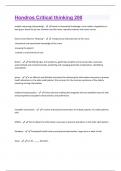Hondros Critical thinking 200
analytic reasoning (interpreting) - based on theoretical knowledge. nurse makes a hypothesis or
best guess about the pt care situation and then tests. typically students and novice nurses
factors that influence "Noticing" - -intrapersonal characteristics of the nurse
-theoretical and experiential knowledge of the nurse
-knowing the patient
-context or environment of care
Notice - Identifying signs and symptoms, gathering complete and accurate data, assessing
systematically and comprehensively, predicting and managing potential complications, identifying
assumptions
spices - is an efficient and effective instrument for obtaining the information necessary to prevent
health alterations in the older adult patient. this acronym for the common syndrome of the elderly
requiring nursing intervention.
evidence-based practice - clinical decision making that integrates the best available research with
clinical expertise and patient characteristics and preferences
Complete assessment - A review and physical examination of all body systems, for stable patients
only
SPICES - Tool to obtain the information necessary to prevent alterations in the older adult patient
Database - Completed health history and physical examination, large store or bank of info
sleep - S is for _____ disorders
,S in SPICES - Sleep disorders
clinical reasoning - is the thinking process by which a nurse reaches a clinical judgement. an
iterative process of noticing, interpreting, and responding- reasoning in transition with a fine attunement
to the patient and how the patient responds to the nurses action
Psychosocial history - Psychological and social factors
problems - P is for _______ with eating or feeding
P in SPICES - Problems with eating or feeding
I in SPICES - Incontinence
incontinence - I is for _________
1st method of data collection - Interiew patient, health history. Patient is your primary source
2nd method of data collection - Physical examination ( guided by subjective and objective)
Tanner's Model - Noticing
Interpreting
Responding
Reflecting
confusion - C is for ______
C in SPICES - Confusion
,clinical judgment - "Thinking Like A Nurse". integral to the Safety of pt. Interpretation or
conclusion about a patient's needs, concerns, or health problems, and/or the decision to take action (or
not), use or modify standard approaches, or improvise new ones as deemed appropriate by the patient's
response.
noticing (tanners model) - identify s/s, gather complete and accurate data, assessing
systematically and comprehensively, *predicting (and managing) potential complications, identifying
assumptions
Concepts of clinical judgment - 1. Safety
2. Healthcare quality
3. Leadership
4. Patient education
5. Evidence
6. Professionalism
7. Care coordination
evidence - E is for ___________ of falls
objective data (noticing) - information that is seen, heard, felt, or smelled by an observer; signs
E in SPICES - Evidence of falls
Analytic reasoning - Situation is unfamiliar
skin - S is for __________ breakdown
S in SPICES - Skin breakdown
, subjective data (noticing) - things a person tells you about that you cannot observe through your
senses; symptoms
Intuitive reasoning - Able to recognize the situation immedialy. Pattern based
epworth sleepiness scale - widely used in the field of sleep medicine as a subjective measure of a
patients sleepiness.
- no chance of dozing = 0
- slight chance of dozing= 1
- moderate chance of dozing= 2
- high chance of dozing= 3
Interpret - Clustering related data, recognizing inconsistencies, checking accuracy and reliability,
compare and contrast data,distinguish relevant from irrelevant information,determining the importance
of information, judging how much ambiguity is acceptable, using legal ethical and professional
guidelines, predicting and managing potential complications
0-7 - it is unlikely that you are abnormally sleepy
Narrative reasoning - Situation to patient experience with illness.
Interpreting (tanners) - comparing and contrast data, clustering related information, recognizing
inconsistencies, checking accuracy, distinguishing relevant from irrelevant, determine importance of info,
judge how much ambiguity is acceptable (ie b/p dt condition), determine legal ethical professional
guidelines, (predicting and) *managing potential complications
Interpreting (tanners) - comparing and contrast data, clustering related information, recognizing
inconsistencies, checking accuracy, distinguishing relevant from irrelevant, determine importance of info,
judge how much ambiguity is acceptable (ie b/p dt condition), determine legal ethical professional
guidelines, (predicting and) *managing potential complications
8-9 - you have an average amount of daytime sleepiness




